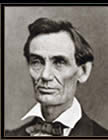An Analytical Biography of a Great Mind- by Edward J. Kempf
- PART I
- PREFACE
- INTRODUCTION
- Chapter 1 - Lincoln's Physical Constitution
- Hereditary Determination
- Hypersensitive Hypokinetic Constitution
- Meaning of Facial Asymmetries
- Fracture of Skull and Injury of Brain in Boyhood
- Diagnosis of Cerebral Lesion
- Diplopia and Eyestrain
- Borglum's Interpretation of Lincoln's Face
- Enigmatical Character of Facial Expression
- Preference for Photographs of Right Side of Face
- References
Fracture of Skull and Injury of Brain in Boyhood
All of these differences in facial muscle and bone development, like the weakened functioning of the left ocular and facial muscles in particular, indicated to me that Lincoln had suffered a serious injury of his brain in childhood. The sharp depression in the forehead above the left eye with a definitely palpable edge, in the life masks, shows where his skull had been fractured, and the permanent differences in the nervous tone of the ocular and facial muscles of the two sides indicate that his brain was then permanently injured.
Evidence that such an accident occurred was given by Lincoln in his letter to Scripps (1860), where he told that "in his tenth year he was kicked by a horse and apparently killed for a while." More extensive descriptions of the accident by Lincoln to Herndon, and by Dennis Hanks who was living with the Lincolns at the time, provide details of what happened. Although descriptions in Herndon's several accounts (Herndon, 1889; Hertz, 1938) are slightly different, their essentials coincide as combined here.
"Mr. Lincoln told me," Herndon said, "that he had to shell corn with his hands and take it to mill in a sack on horseback, corn in one side and rocks in the other [to balance]. He went to the mill on his father's old [unshod] mare [and] had to wait his turn to grind. It was getting late in the evening and he was some two miles from home ... ; he hitched in his old mare to the sweep-pole or lever that turned the wheel and, being in a hurry to get through with his grist, he urged her to full speed, round and round, ... faster and faster, ... [and as] he struck her with a stick ... [he started] to say: 'Get up-you old hussy.' ... Just as he uttered: 'Get up,' [he] was kicked in the forehead." "Miller Gorden picked up the bleeding, senseless boy, whom he took for dead and at once sent for his father ...." "Abe lay unconscious all night." As he regained consciousness he blurted out 'You old hussy.' "He finished the sentence just as he intended to speak it, commencing where he left off. Lincoln told me this and he and I used to speculate on it."
Young Abe was said, many years later by a cousin, Dennis Hanks, who lived with the Lincolns at the time and was 10 years older, not to have regained consciousness until the next day. He seemed to have recovered without serious mental or physical after-effects since he received no medical attention for the head injury (see Chapter V).
Fractures of the skull and cerebral after-effects were never suspected, or at least never reported by any of Lincoln's physicians although, after 30, he consulted several for treatment of "hypochondria" and other nervous symptoms. This is not surprising for it was not until after 1890, upon application of X-ray photography and neurophysiology that we learned how to explain some of the cerebral effects and nervous consequences of fracture of the skull.
Lincoln was also struck on the head with a club in a fight with Negro marauders while taking a flatboat down the Mississippi, when either 19 or 22. This blow, he said, left a permanent scar. However, it probably did no further damage, for he routed the hoodlums, saved his cargo and continued the journey.
Congenital injury of the nervous system has also been suggested to account for the ocular and facial symptoms but this is discredited by the definite history of a blow on the head in childhood that knocked him unconscious for many hours.{4}
next -->
